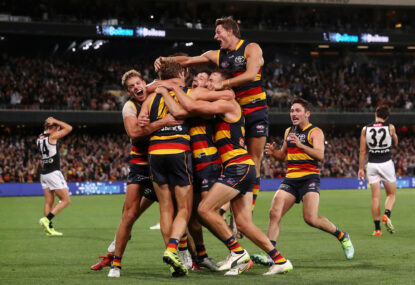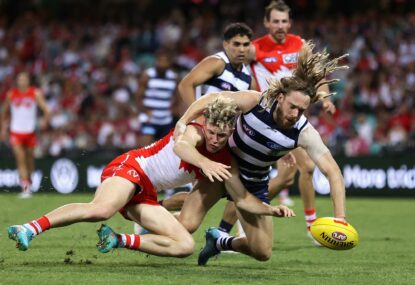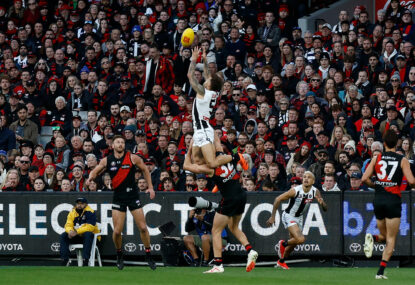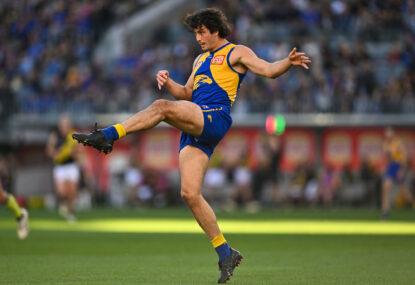 So once again a community in regional Australia has been snubbed by a major sporting body. North Queensland Fury’s axing from the A-League by the FFA this week is just the latest example of sports administrators turning their back on a market outside the five mainland capitals.
So once again a community in regional Australia has been snubbed by a major sporting body. North Queensland Fury’s axing from the A-League by the FFA this week is just the latest example of sports administrators turning their back on a market outside the five mainland capitals.
Only last month, Geelong was told by Cricket Australia it would not be part of the new Big Bash League, with the Twenty20 competition to instead feature two Melbourne-based sides.
In recent years, Tasmania’s efforts to join the AFL have been met with only lip service from Andrew Demetriou and his team.
There are some striking similarities between all the above cases, but let’s just start with the Fury.
What makes this particular story sad is the sense of inevitability about the final decision. It had appeared for some time that regardless of what the Fury did, and regardless of what the people of North Queensland did, the FFA had their minds made up and would still wield the axe.
And sure enough, they did. On Tuesday, FFA CEO Ben Buckley claimed that running the club for the 2011/12 season would be too much of a financial risk for the game’s governing body. He said the advisory board did not meet a target of $1.5 million in capital and continuing the club next season would result in a $2 million loss.
A day later, the advisory board disputed these figures and even claimed they had been told all the targets set to them had been met.
“A couple of weeks ago when we had a hook-up with the FFA, we were left in no uncertain terms by the FFA that we had done everything we possibly could to save the Fury,” board member Peter Brine said. “Their comment was ‘you guys have been excellent, you have done everything you can now, leave it with us’.”
The response from the advisory board, who are asking for an independent investigation of the decision, hardly reflects well on the game’s governing body.
But even if you overlook the squabble over what was said and how much was raised, it remains that the decision to axe the Fury – after all the hard work from locals to prevent such a decision – was truly a kick in the guts for North Queensland.
Especially when you take a look around the A-League and notice the continued presence of Gold Coast United, a club that could attract only 3,281 to a recent home final and with less community support than the Fury.
It seems a billionaire owner and being in a key battleground of the so-called “code wars” is enough to keep you in the A-League, but a community-led campaign to ensure the long-term future of a club is not.
At any rate, the end result is North Queensland now no longer has an A-League team – and it may take a long time for residents of the region to forgive the game’s administrators for that.
Before all the fury over the Fury, it was Cricket Australia turning their backs on regional Australia.
Cricket’s governing body rejected a proposal that would’ve seen one of Victoria’s two teams in the new Big Bash League based in Geelong. Instead, the two teams will both be based out of Melbourne, with the only significant difference between the two teams being that one will be based at the MCG and the other at Etihad Stadium.
Prior to the announcement of the teams that would be competing in the league, Geelong’s bid was highly regarded and was thought to be in with a good shot. The bid team – just like Fury’s advisory board – gave their all, with the only possible mark against the bid the lack of lights at Skilled Stadium, something that the team promised to address if their bid was successful.
Even Cricket Australia’s Mike McKenna, who would later write for The Roar defending the decision to overlook Geelong, spoke highly of the bid.
“I have seen the proposal and it’s very impressive and extremely well presented,” McKenna told the Geelong Advertiser. “I think they’ve got all the right people on board, they’ve made the right sort of offers and they’ve done a really professional job, so without wanting to even suggest that I have any idea which way Cricket Victoria is going to go, I would say cricket would be very pleased to have a proposal like that come forward.”
Ultimately, though, having a bid that ticked all the boxes wasn’t enough.
And the reason for being overlooked makes it so much worse. Just as Gold Coast United’s continued presence in the A-League perplexes, so too does the decision to divide the Melbourne market in two and have those two teams build their support from scratch.
Geelong would’ve embraced a Big Bash team had they been given the opportunity. While they enjoy watching the Cats in winter, there is no summer alternative – like Newcastle have with the A-League’s Jets, or Wollongong with the NBL’s Hawks.
Residents of Geelong will now have to wait even longer for that opportunity.
In the backdrop of these two cases is the ongoing efforts of Tasmania to land an AFL license. As the AFL worked tirelessly to create its 17th and 18th clubs, Gold Coast and GWS, the Apple Isle became increasingly frustrated by their exclusion from the competition.
And with good reason. Tasmania, much unlike the Gold Coast and western Sydney, is a footy heartland. The state’s population dwarfs that of Geelong, who have their own team. It also compares well to that of the Gold Coast and half of Adelaide, where Port Adelaide have below 50 per cent market share.
The campaign to land an AFL license was well supported – to the point that a major sponsor was secured – and even led to a Senate inquiry.
However, it wasn’t enough to convince the AFL. The message from the game’s governing body is that it will stick to 18 teams for the time being, but Tassie is “next in line”. In other words, another club will need to fold or relocate, or the AFL will need to instigate another round of expansion.
Both are highly unlikely – for the short- to medium-term anyway.
It’s a shame because Tasmania deserve a place in the AFL. They would be a wonderful addition to the league, but it will be some time before it happens, if it ever happens.
Commercial reasons explain the desire to ignore markets like North Queensland, Geelong and Tasmania.
To an extent, you can understand the FFA being wary of their balance sheet. You can grapple with the idea of Cricket Australia trying to squeeze every last dollar out of the sizeable Melbourne market. It makes a fair amount of sense for the AFL to try and expand into new markets.
However, the final outcome of all this means each code misses out on a fantastic opportunity. And communities in regional Australia miss out on being represented on the national stage.
It’s a sad outcome for all involved.



































































































